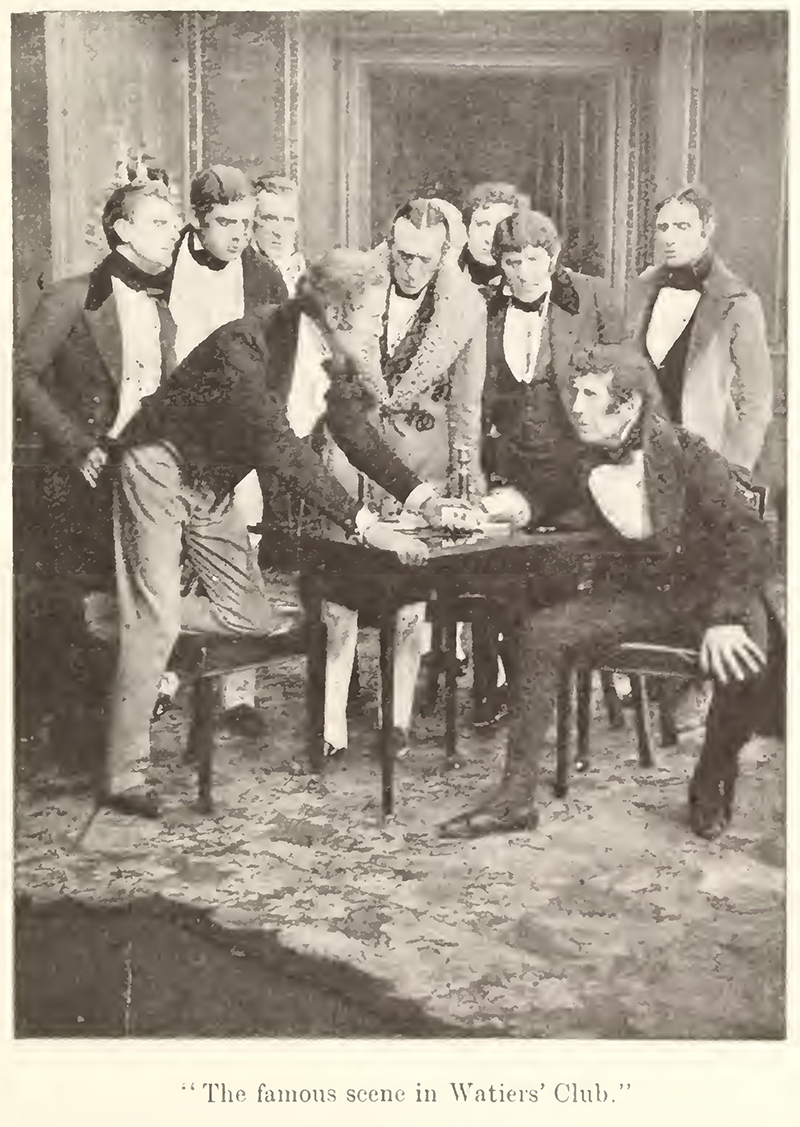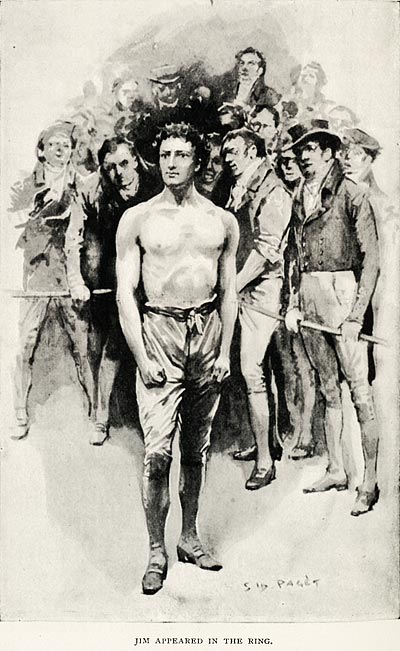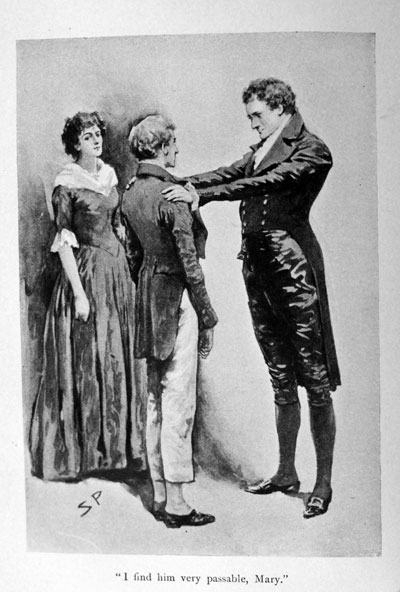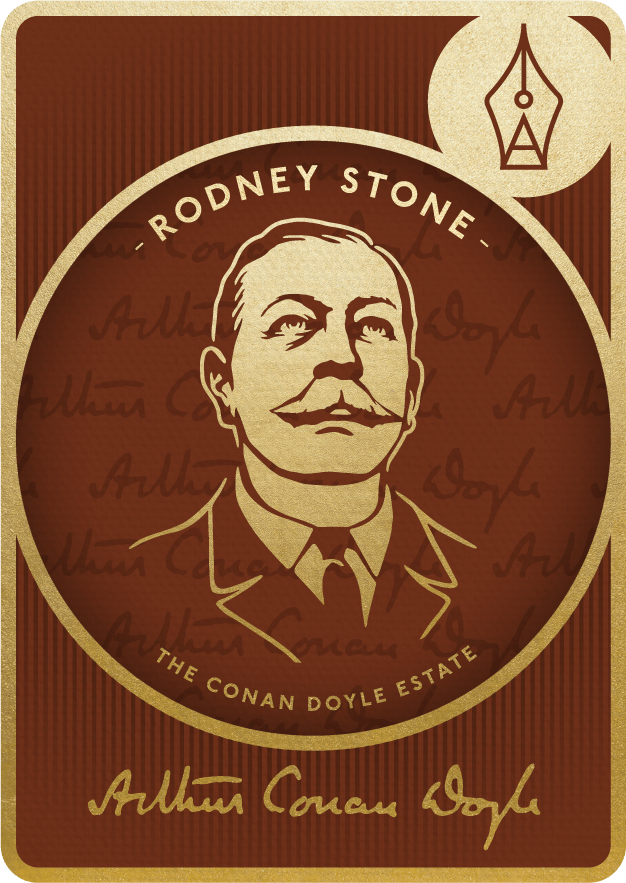 From the 1913 movie version ("The House of Temperley")
From the 1913 movie version ("The House of Temperley")
 1896 Sidney Paget illustration
1896 Sidney Paget illustration
 Rodney as a boy, by Sidney Paget
Rodney as a boy, by Sidney Paget
For most of Rodney Stone’s boyhood his father is absent at the war, fighting under Admiral Lord Nelson in the struggle against Napoleon. Though Rodney’s family are of modest means, his mother’s brother is Sir Charles Tregellis, a friend of the Prince of Wales, son of King George III.
Rodney goes to school with Boy Jim, the nephew of Champion Harrison, who had been a famous prizefighter at a time when a bout between pugilists could attract a crowd of tens of thousands, as well as the attention and sponsorship of “the Fancy,” the class of sporting aristocrats which includes Rodney’s uncle. With this set-up, apparently effortlessly, Conan Doyle lays the foundations for a historical novel that reaches from top to bottom of English society in the early nineteenth century.
Rodney Stone in his old age tells the story, with vivid recollection and at a good pace, but he is not the most colourful character of the tale. The real hero of Rodney Stone is boxing, a sport which fascinated Conan Doyle, especially in that phase where it was the most popular spectator sport in England. Fans of all classes followed the fortunes of the great bare-knuckle champions who duked it out in open-air bouts which sometimes lasted for hours, with a rudimentary code not yet regulated by the introduction of the Marquess of Queensberry’s Rules, or made less dangerous by the wearing of boxing gloves which padded the blow of a fist. It was a brutal spectacle as well as a contest of skill, and sometimes huge amounts were wagered on the result, making it liable to the corruption and cheating which help to shape the melodramatic plot of Rodney Stone. At its best though, Conan Doyle saw the participants of boxing, fighters and spectators, as a democratic embodiment of the national character, the heroic quality of sportsmanlike bravery which helped the English to triumph over Napoleon and emerge as the greatest of world powers.
Rodney Stone reminisces at one point: “The ale-drinking, the rude good-fellowship, the heartiness, the laughter at discomforts, the craving to see the fight — all these may be set down as vulgar and trivial by those to whom they are distasteful; but to me, listening to the far-off and uncertain echoes of our distant past, they seem to have been the very bones upon which much that is most solid and virile in this ancient race was moulded.”
But back to Rodney himself. He tags along after his uncle, and learns about the world of fashion and high society. And he tags along after his friend Boy Jim Harrison, who is determined to make a name for himself in the ring like his uncle the champion boxer. A match is arranged on Crawley Downs between Crab Wilson, a pugilist from the West Country sponsored by the dastardly Sir Lothian Home, and Boy Jim, backed by Rodney’s uncle. More than reputations and rivalries are at stake: massive amounts are bet on both fighters. This sporting plot takes place against the historical background of a time of brief truce in the wars against Napoleon. In fascinating ways, this story of working-class pugilists, and the aristocratic amateurs of sport who are their patrons, has as much to say about Conan Doyle’s idea, or ideal, of the nation and empire as do his tales of Sir Nigel Loring and the White Company.
At the end of the story Rodney and his father both leave to join the fleet that was to triumph at Trafalgar under Nelson’s command. Nelson himself appears in one of the chapters, as do a number of actual historical figures, from the Prince of Wales and Beau Brummel to many of the celebrity bare-knuckle boxers of the age, including the legendary Jem Belcher and Jack Harrison. Conan Doyle took great pains, as usual, over the historical detail of how people dressed and talked and behaved (and fought) in the first decade of the nineteenth century. He had studied the extensive literature of boxing, with titles like the anonymous Fistiana: or, The Oracle of the Ring, Comprising a Defence of British Boxing, a Brief History of Pugilism, from the Earliest Ages to the Present Period, Practical Instructions for Training, Together with Chronological Tables of Prize Battles, from 1780 to 1840 Inclusive. This historical actuality serves as background to the story of the Harrisons, uncle and nephew, Crab Wilson, and Sir Lothian Home. Sir Lothian is a pantomime aristocratic villain, who does his best to fix the fight, just as years before he had cheated a cousin out of his inheritance. Will wickedness triumph, or will good prevail?
Rodney Stone, meanwhile... well, the truth is that Rodney Stone, as a character, while amiable enough, is not really very interesting. But he tells a cracking good story.
--
Douglas Kerr was born in Dundee, Scotland, and matriculated at Trinity College, Cambridge, and Warwick University. Long a professor of British Literature at the University of Hong Kong, he is the author of Conan Doyle: Writing, Profession, and Practice (Oxford University Press, 2013). He now lives in London, and is the editor-in-chief of Edinburgh University Press’s forthcoming Edinburgh Edition of the Works of Sir Arthur Conan Doyle.

